Smolensk tragedy continues to haunt Poland
- Published
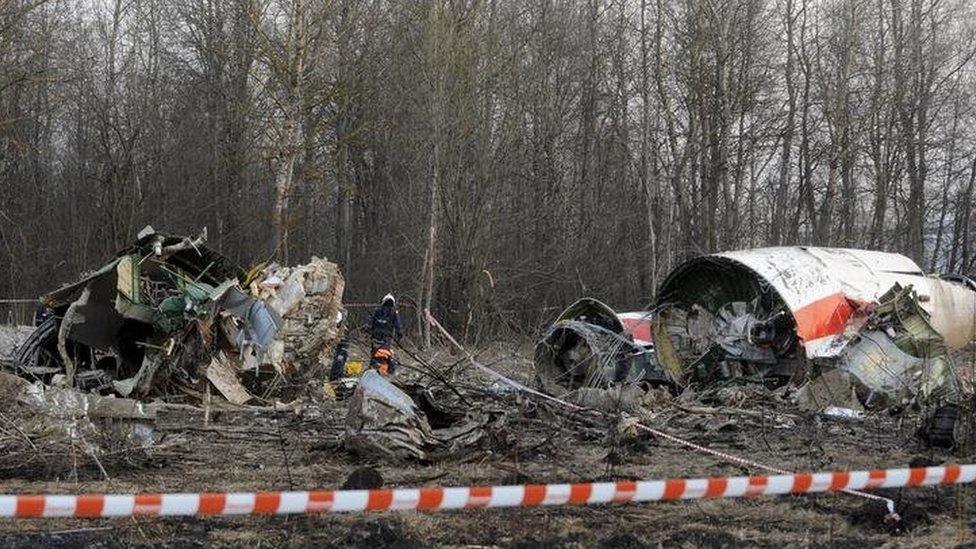
Polish President Lech Kaczynski and 95 other people - including many top state officials - were killed in the Smolensk crash
The plane crash in Smolensk in April 2010 that killed the Polish President Lech Kaczynski and all 95 others on board has returned to the forefront of the country's politics.
Some in the opposition are accusing the new government of seeking revenge for the disaster, external, whose victims also included the heads of the armed forces and the central bank.
On Thursday five people involved in the organisation of the flight are scheduled to give evidence in the first trial relating to the crash.
Most senior among them is Tomasz Arabski, who in April 2010, led the office of the then prime minister, Donald Tusk, who's now the President of the European Council.
Mr Arabski and the others are accused of failing to uphold their obligations as public officials. They face up to three years in prison if convicted.
Members of the governing Law and Justice (PiS) camp have said it would be a good idea if Mr Tusk himself was brought before the country's State Tribunal to answer accusations of negligence for his handling of the disaster.
In April 2010, relations between President Lech Kaczynski, the twin brother of Jaroslaw, who still leads PiS, and Mr Tusk's centre-right government were tetchy and both camps competed to represent Poland abroad.
That year marked the 70th anniversary of the Katyn massacre, external, during which the Soviet secret police murdered more than 21,000 Polish officer prisoners of war, as it attempted to eradicate the country's elite.
Instead of Prime Minister Tusk and President Kaczynski jointly heading commemorations in Katyn, near Smolensk, two separate events were arranged.
On 7 April, Mr Tusk landed at Smolensk in clear blue skies to take his place alongside Vladimir Putin in a ceremony to honour the victims, the first time a Russian leader had taken part in such an event.
Three days later, in dense fog, President Kaczynski's plane crashed just short of the same former military airport as his delegation made its way to the second ceremony.
Representatives of all Poland's political parties were among the victims, but they predominately belonged to the PiS camp.
Personal motivation
Jaroslaw Kaczynski, who last spoke to his brother by telephone during the early morning flight, has worn a black suit and tie in public ever since.
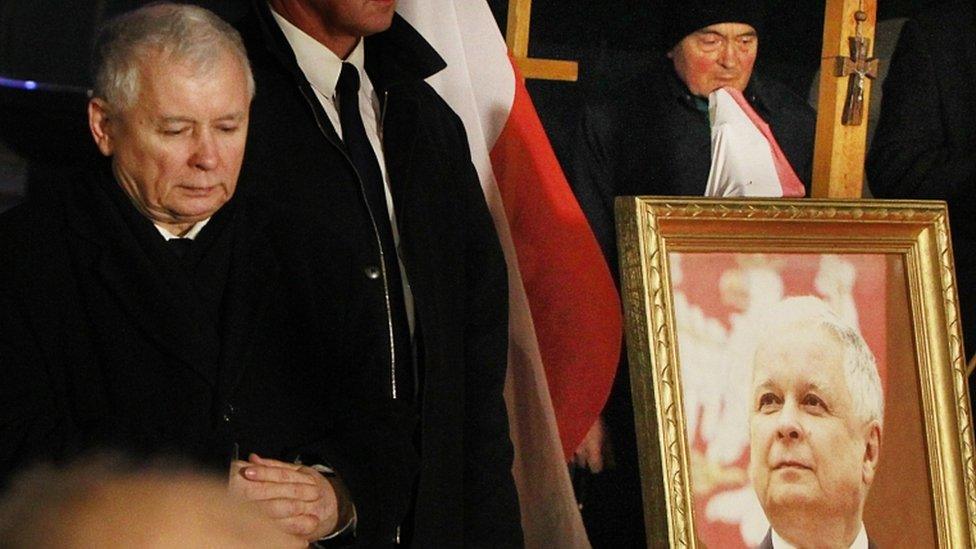
Jaroslaw Kaczynski mourns for his twin brother, who died in the crash
Two years after the disaster, Jaroslaw Kaczynski stood before Mr Tusk during a parliamentary session and told him: "Everything that happened before the catastrophe is your fault. This is the result of your policies. In the political sense you bear 100% responsibility for the catastrophe in Smolensk".
Now Jaroslaw Kaczynski's PiS party is in office and Ryszard Petru, who heads the opposition Nowoczesna (Modern) party, believes he is motivated by his personal loss.
"This is my theory, this is revenge because he (President Kaczynski) was forced to land and it was due to the fact there was competition between these two and the best way for revenge is to put into jail those who were responsible for the crash," Petru said.
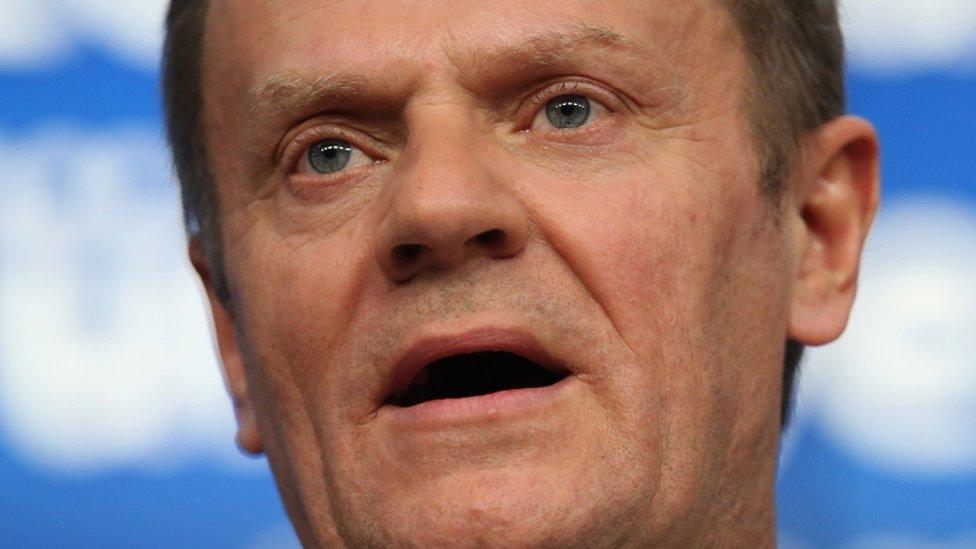
Donald Tusk has been criticised for his handling of the disaster
Tomasz Arabski has said he supervised the organisation of Prime Minister Tusk's visit and was not involved in the preparations for President Kaczynski's flight.
In an investigation, prosecutors said they discovered irregularities during the organisation of the flight but they were insufficient to bring charges and the case was dropped. The case against Mr Arabski and the four others has been brought privately by some of the victims' family members.

Smolensk tragedy
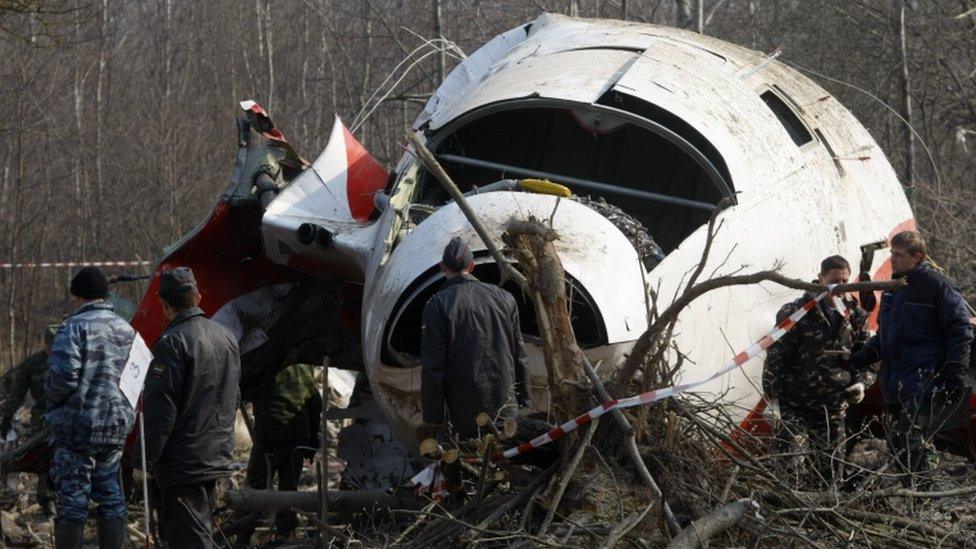
Wreckage of Tupolev near Smolensk
Ninety-six people were killed when the Tupolev plane they were travelling in went down in thick fog, short of the runway near Smolensk in western Russia.
The high-level delegation was on its way to Katyn to mark the 70th anniversary of the murder of thousands of Polish officers by Soviet secret police.
Among those who died were:
President Lech Kaczynski and wife Maria
Wladyslaw Stasiak: Chief of the president's chancellery
Aleksander Szczyglo: Chief of the National Security Office
Slawomir Skrzypek: National Bank of Poland chairman
Jerzy Szmajdzinski: Deputy speaker of the lower house
Andrzej Kremer: Foreign Ministry's undersecretary of state
Stanislaw Komorowski: Deputy minister of national defence
Przemyslaw Gosiewski: Law and Justice party deputy chair;
Franciszek Gagor: Chief of the General Staff
Andrzej Przewoznik: Head of Poland's Council for the Protection of Struggle and Martyrdom Sites
Tomasz Merta: Chief historical conservator

Public suspicion
More than three quarters of Poles believe Mr Tusk's government did not do enough to explain the causes of the crash. Critics say Mr Tusk should not have allowed the Russians to conduct the first crash investigation.
In a CBOS opinion poll on the fifth anniversary of the disaster, only 20% said the crash had been fully explained, while 31% said it had been the result of an assassination or attack.
The poll did not ask who would have carried out such an act, but one presumption is that since the plane came down in Russia, it would have been orchestrated by Moscow.
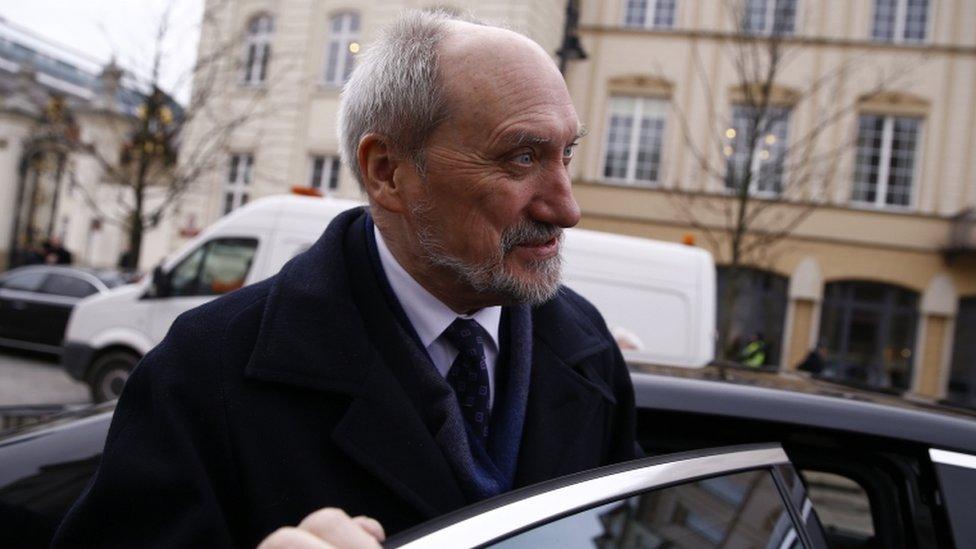
Antoni Macierewicz blames Russia for the crash
It is a view promoted by Antoni Macierewicz - a close confidant of Jaroslaw Kaczynski - since 2011. He has repeatedly argued that two explosions caused the crash.
Two weeks ago, Mr Macierewicz, who is now the Polish defence minister, told a university audience, external that Poland had been the first victim of terrorism in the 1930s and "after Smolensk we can say that we were also the first great victims of terrorism in contemporary conflicts".
To date, the completed official investigations into the crash have said there is no evidence that an explosion caused it.
An investigation conducted by aviation experts under Mr Tusk's government largely agreed with an earlier Russian probe that blamed the crash on pilot error.
The Polish investigation , externalconcluded that the "hastily, haphazardly" trained crew had flown too low, ignoring repeated warnings to pull up, in weather conditions that meant they were unable to see the ground.
The 20-year-old Russian made Tupolev TU-154M plane then hit trees, shearing off part of its left wing, causing it to turn upside down before hitting the ground.
Unlike the Russian investigation, the Polish one also said the Russian air traffic controllers had been at fault for misinforming the crew about the plane's position.
Mr Macierewicz believes those investigations contain errors and he recently launched another investigation to review new information he says he now possesses.
Six years on from the tragedy, the crash continues to haunt Polish politics.
- Published4 February 2016
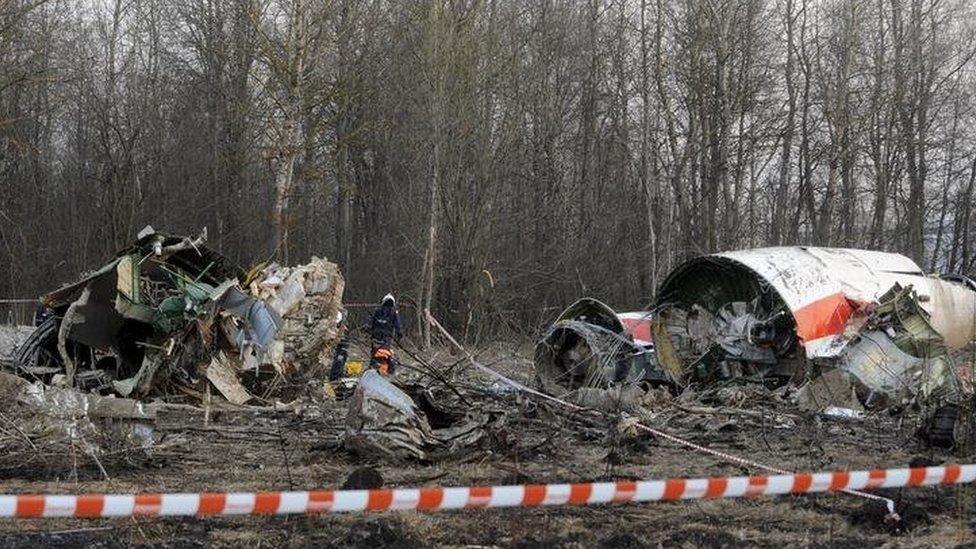
- Published25 November 2015
- Published10 April 2015
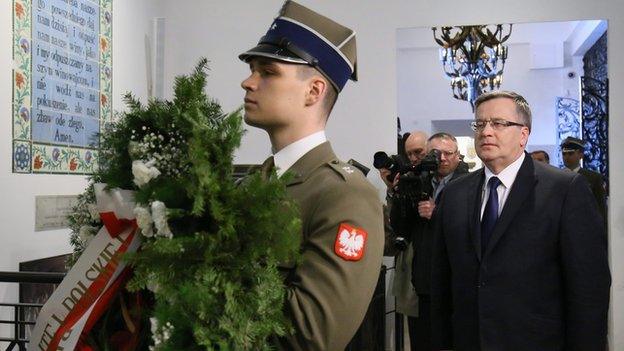
- Published10 April 2011